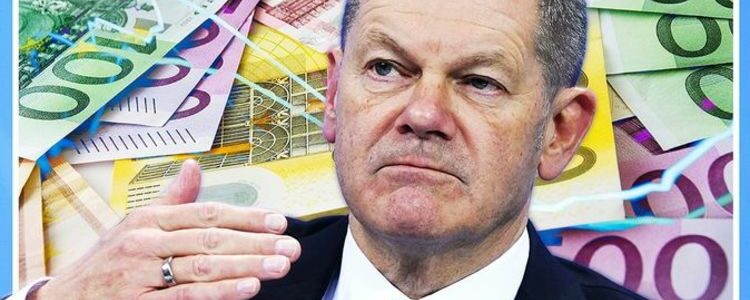
German economy on brink: Growth grinds to halt as Merkel’s successor confirmed
Jens Spahn' statement on Germany's coronavirus winter status
We use your sign-up to provide content in ways you’ve consented to and to improve our understanding of you. This may include adverts from us and 3rd parties based on our understanding. You can unsubscribe at any time. More info
Yesterday Germany’s Social Democrat, Green and liberal parties agreed a three way coalition deal making Olaf Scholz the new Chancellor. Mr Scholz will succeed Angela Merkel who has been in the role for 16 years. But a number of key data sets suggest Mr Scholz will be facing something of a struggle when it comes to Germany’s economy. This morning GDP figures for Germany’s third quarter found growth disappointingly below expectations with the economy only expanding 1.7 percent.
Growth remains 1.1 percent below pre-pandemic levels.
Head of Investment at Interactive Investor Victoria Scholar noted it was a mixed picture with entertainment and recreation remaining “bright spots” growing 13.5 percent while the car industry was continuing to suffer from supply chain issues.
Head of Macro Analysis at Saxo Bank Christopher Dembik said: “The worst is yet to come with the energy crunch intensifying and risk of lockdown.
“All of that on top of supply chain bottlenecks.
“We cannot exclude that German GDP will slow down significantly in Q4.


“In the event of a new lockdown, it could even cause a contraction of GDP.”
Consumer confidence has taken a battering due to a combination of rising prices and the spread of Covid.
The GfK Consumer Climate Study found expectations of income and likelihood of making a large purchase both declined along with general sentiment in the economy.
Rolf Bürkl, GfK consumer expert, explained: “Consumer sentiment is currently being squeezed from two sides.
“On the one hand, the number of cases in the fourth wave of the coronavirus pandemic is exploding, which threatens to overwhelm the health system and could lead to further restrictions.

“On the other hand, the purchasing power of consumers is dwindling due to a high inflation rate of four percent.
“The outlook for the upcoming Christmas season is now somewhat bleak.“
Yesterday business confidence was also shown to be faltering.
The Ifo index which tracks business sentiment in the economy sank to its lowest level since February this year.
DON’T MISS:
Evergrande breakthrough as buyer makes huge profit after share surge [REVEAL]
Euro slumps over lockdown fears [SPOTLIGHT]
Cryptocurrency battle looms over India ban fears [ANALYSIS]

Once again concerns over the fourth wave of Covid and fears of new restrictions were a major factor as well as supply chain bottlenecks.
Eyes will be focused on Mr Scholz’s handling of country’s finances with expectations of greater relaxation compared to under Angela Merkel.
Steen Jakobsen, Chief Investment Officer at Saxo Bank, suggested bond investors could look forward to “an accommodative fiscal policy for 2022 and 2023” with more spending after Mr Scholz announced a “decade of investment”.
Source: Read Full Article